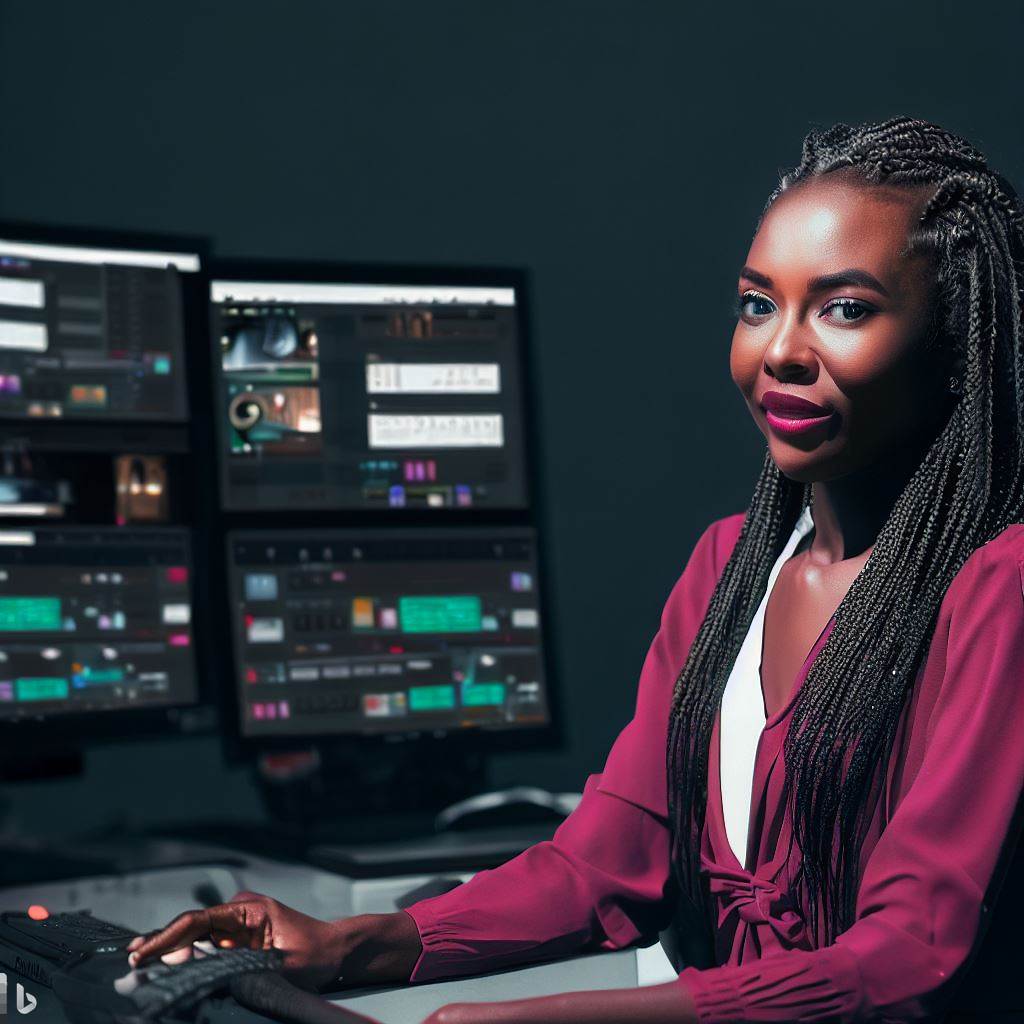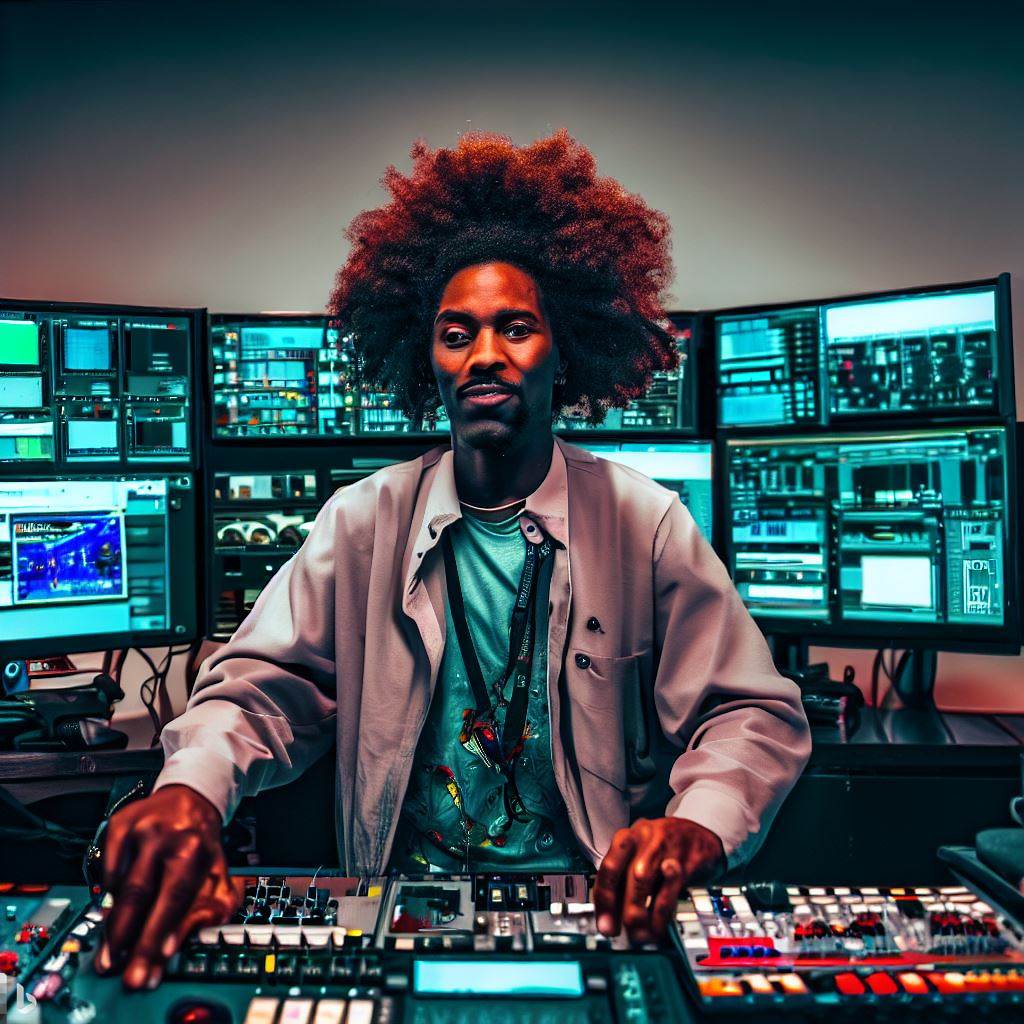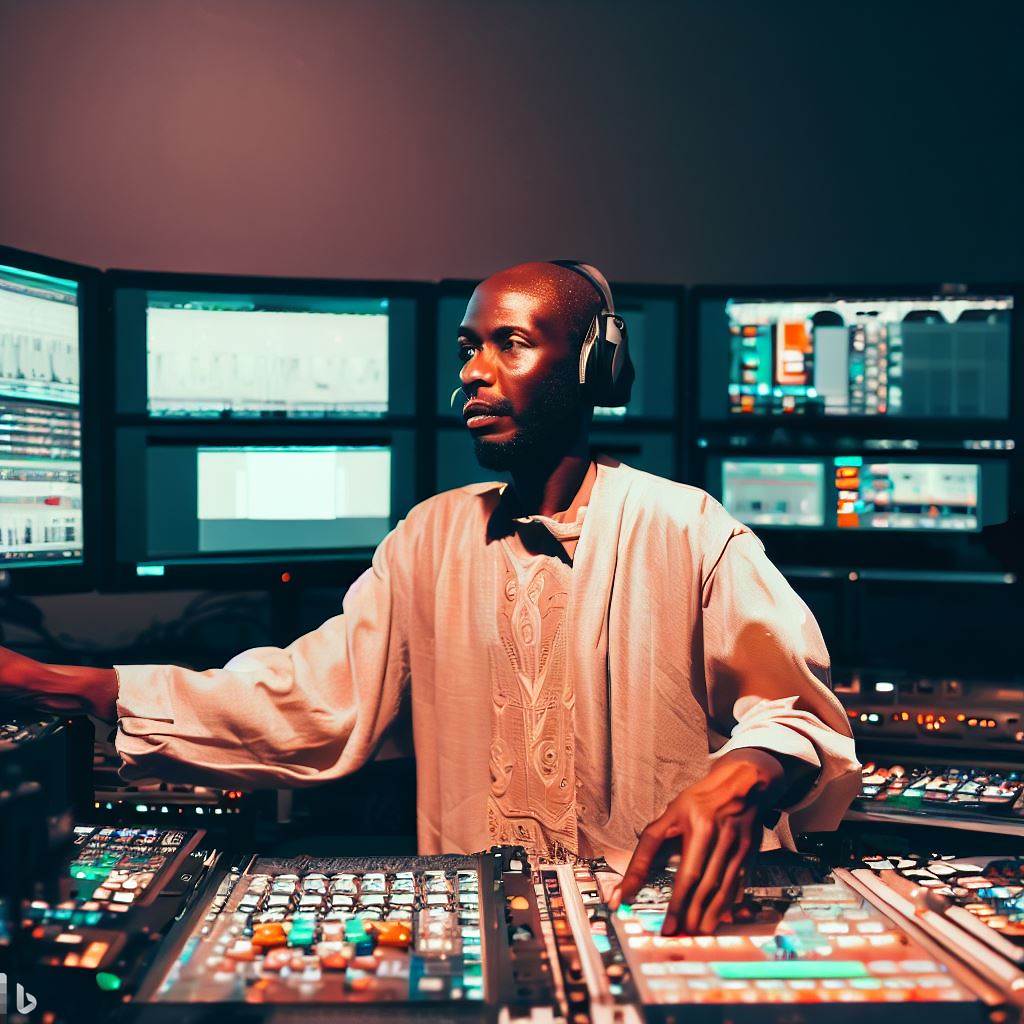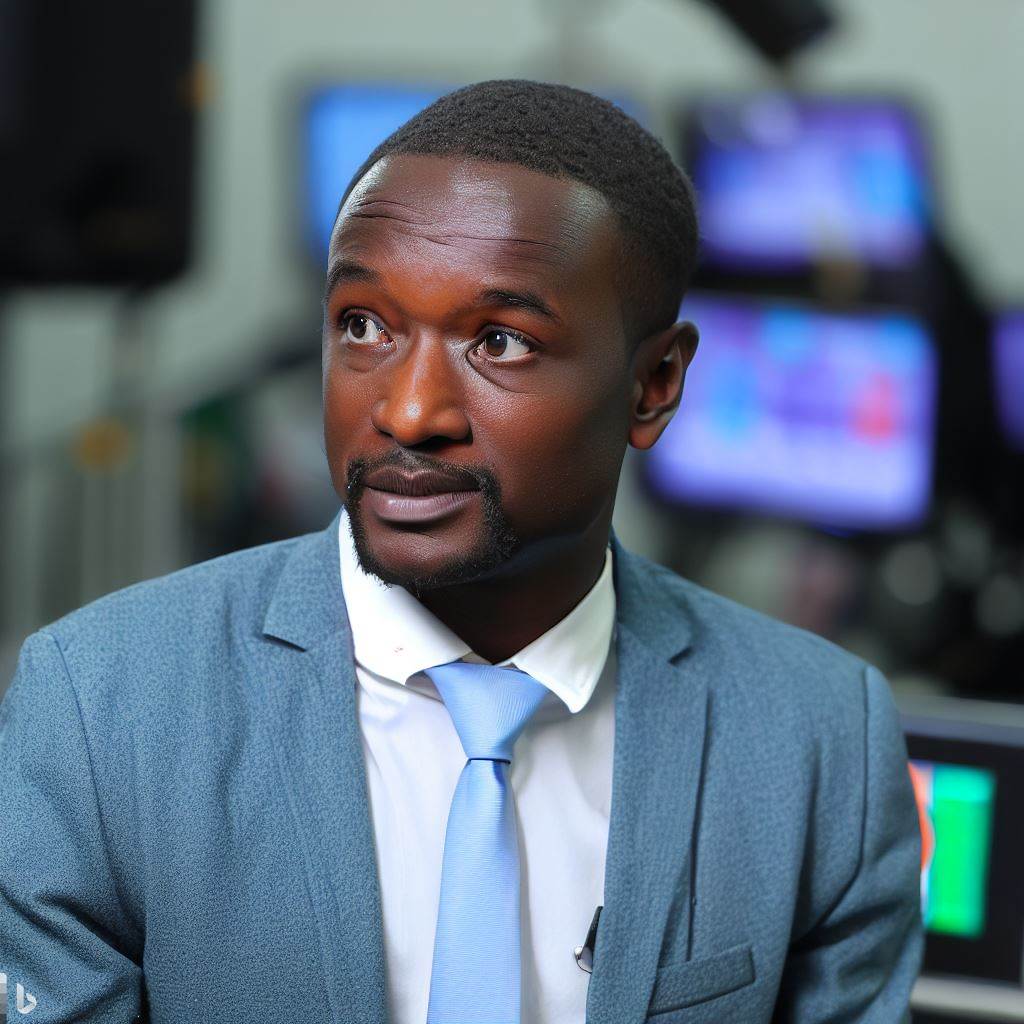Introduction
Understanding the Comparison between TV Editor Roles in Nigeria Vs. Globally, distinctions and resemblances between TV editing roles in Nigeria and the global landscape is crucial.
Nigeria boasts one of Africa’s most extensive television industries, showcasing a diverse array of local content.
In contrast, the global TV industry exhibits varying scales and production capacities across different regions.
This blog post’s primary objective is to conduct a comprehensive comparison of TV editor roles in Nigeria and the global context.
We will delve into their responsibilities, requisite skills, and industry standards, shedding light on the striking disparities and commonalities between them.
Overview of TV Editor Roles
A. The role of a TV editor
A TV editor is a professional responsible for assembling, organizing, and manipulating audiovisual materials to create a cohesive and engaging television production.
They play a crucial role in shaping the final product that viewers see on their screens.
B. The responsibilities and tasks commonly associated with TV editors
- Reviewing and selecting footage: TV editors carefully watch through all the recorded footage and choose the best shots to include in the final production. They analyze performances, camera angles, and technical quality.
- Cutting and editing: Using specialized software, TV editors cut and arrange the selected footage, removing any unnecessary or repetitive parts. They focus on creating a smooth flow and maintaining the desired pace of the program.
- Adding visual and audio effects: TV editors enhance the visual appeal of the production by incorporating effects such as transitions, overlays, and animations. They also ensure proper synchronization of audio with visual elements.
- Fine-tuning the story: TV editors work closely with directors and producers to shape the narrative of the program. They make creative decisions regarding the sequence of scenes, character development, and overall storytelling.
- Color correction and grading: To maintain consistency and visual quality, TV editors adjust the color and tone of the footage. They correct any technical issues, ensuring that scenes appear natural and visually appealing.
- Collaborating with other team members: TV editors work in coordination with various professionals involved in the production process, such as directors, cinematographers, sound designers, and graphic artists. They communicate and exchange feedback to achieve a unified vision.
C. Importance of TV editors in the production process
- Maintaining continuity: TV editors ensure that scenes flow seamlessly and maintain consistent visual and narrative continuity, enhancing the overall viewing experience.
- Enhancing storytelling: By making strategic editing choices, TV editors can enhance the impact of the story, emphasizing key moments, building suspense, or evoking specific emotions.
- Creating a polished final product: TV editors play a crucial role in polishing the raw footage, transforming it into a professional and engaging television production. Their expertise elevates the visual appeal and quality of the content.
- Managing time constraints: TV editors work within tight deadlines, efficiently organizing and prioritizing their tasks to deliver the final product on time. Their ability to work under pressure ensures timely broadcast and distribution.
- Adapting to different genres and styles: TV editors possess versatile skills to cater to various genres, including news, documentaries, reality shows, dramas, and sitcoms. They adapt their editing techniques to suit the specific requirements of each genre.
Basically, TV editors are integral to the production process, utilizing their creative and technical skills to shape the final product.
They bring together various elements to create visually appealing and cohesive television programs.
The responsibilities and tasks associated with TV editors are diverse, covering everything from footage selection to adding effects and color correction.
Their contribution greatly influences the overall quality and impact of the content.
Read: Steps to Landing Your First TV Editing Job in Nigeria
TV Editor Roles in Nigeria
A. Typical role of a TV editor in Nigeria
- TV editors in Nigeria are responsible for editing and assembling recorded raw footage.
- They work closely with producers, directors, and other team members to create compelling visual content.
- TV editors in Nigeria also play a crucial role in storytelling, ensuring that the final product meets the desired narrative.
- They edit videos, audios, and graphics to enhance the overall quality of the program.
1. Differences in terms of responsibilities and tasks compared to global standards
- In Nigeria, TV editors often have additional responsibilities, including color grading and sound editing.
- Unlike in some global standards, Nigerian TV editors are expected to work within tight schedules and limited budgets.
- Nigerian TV editors may also need to handle multiple projects simultaneously due to the demand for content.
- They often face more pressure in meeting deadlines and adapting to rapidly changing editing trends.
2. Skills and qualifications required for TV editors in Nigeria
- TV editors in Nigeria need to have a strong understanding of various editing software, such as Adobe Premiere Pro and Final Cut Pro.
- They should possess excellent attention to detail and the ability to work under pressure.
- Good communication skills are essential for collaborating effectively with other team members.
- Having a creative eye, technical knowledge, and a good sense of timing is crucial for success as a TV editor in Nigeria.
B. Examples or case studies of successful TV editors in Nigeria
- One successful TV editor in Nigeria is Ego Boyo, who has edited numerous popular TV shows and movies.
- She is known for her exceptional storytelling skills and has contributed significantly to the growth of the industry.
- Another example is Nodash, who is a highly sought-after TV editor in Nigeria, known for his innovative editing techniques.
- Despite their achievements, TV editors in Nigeria face challenges such as limited resources and recognition for their work.
1. Their achievements and contributions to the industry
- Ego Boyo’s editing prowess has earned her several awards and nominations, raising the bar for other TV editors.
- Nodash’s unique editing style has revolutionized the industry, inspiring aspiring TV editors.
2. Challenges they may face in their roles
- TV editors in Nigeria often struggle with inadequate post-production facilities and equipment.
- They face limited opportunities for professional development and training, hindering their growth.
- Securing fair compensation for their work can be a challenge, as the industry may not always recognize their value.
- High competition and the need to constantly adapt to new technologies and trends add to the challenges faced by TV editors in Nigeria.
Generally, TV editors in Nigeria have unique roles and face both opportunities and challenges.
Their contributions to the industry are significant, although they often work with limited resources and face recognition struggles.
Despite the challenges, successful TV editors like Ego Boyo and Nodash continue to push boundaries and inspire others with their exceptional editing skills and creative vision.
Read: How to Break Into the TV Reporting Scene in Nigeria
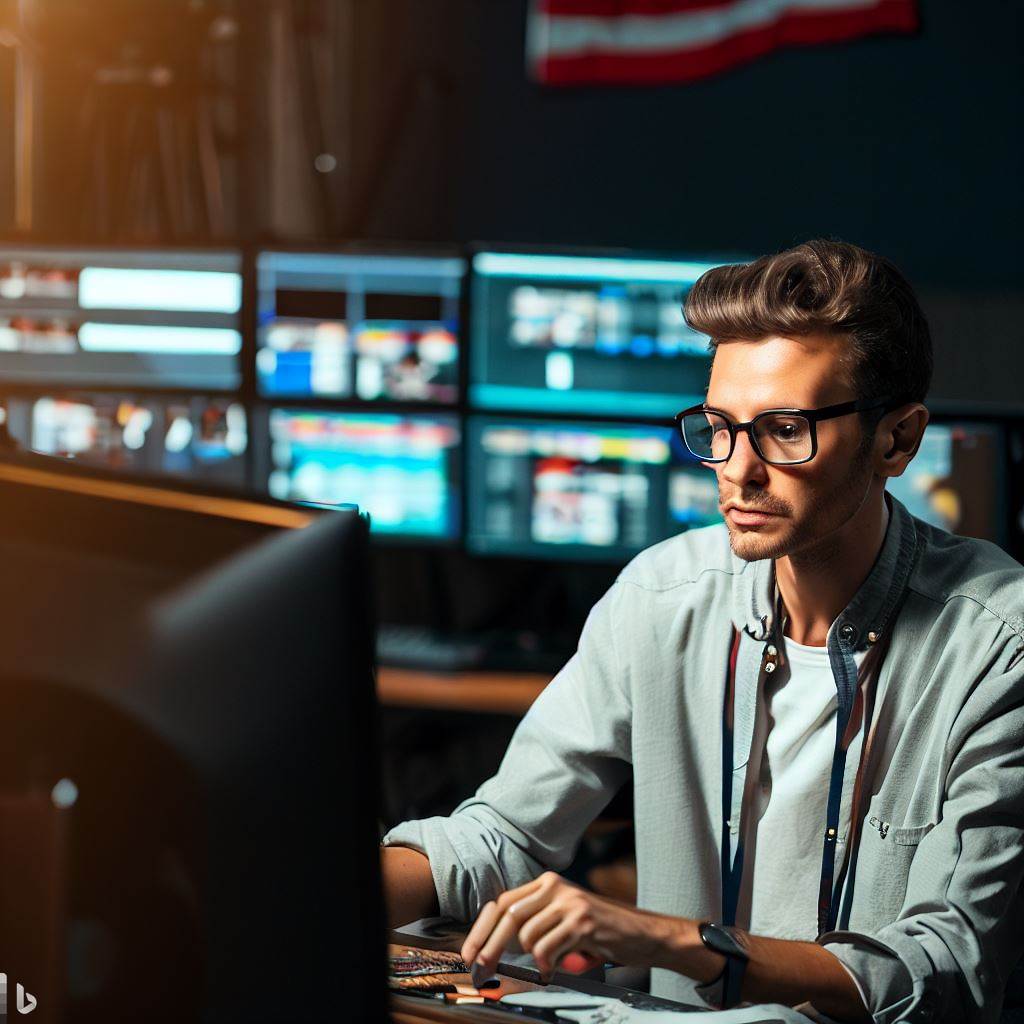
TV Editor Roles Globally
A. Standard roles and responsibilities of TV editors worldwide
- TV editors play a critical role in shaping the final product of a television show or program.
- They are responsible for selecting and assembling footage to create a coherent, visually engaging story.
- In many countries, TV editors are involved in script analysis and making creative decisions on shot sequencing.
- Additionally, they collaborate closely with directors and producers to ensure the show’s vision is maintained.
- The responsibilities of TV editors also include synchronizing audio and video elements, adding special effects, and color correction.
B. Skills and qualifications expected from TV editors internationally
- TV editors are expected to have a strong technical knowledge of various editing software and equipment.
- They should be proficient in using editing techniques to create seamless transitions and captivating visuals.
- Attention to detail is crucial as TV editors need to identify and correct errors in continuity or pacing.
- Excellent communication and collaboration skills are essential for effectively working with other members of the production team.
- Adaptability and ability to work under tight deadlines are important qualities for TV editors.
1. Notable trends or practices in different countries
- In countries like the United States and the United Kingdom, TV editing is considered a specialized profession.
- There is a growing trend of TV editors having their own editing suites and working remotely.
- Many international TV editors are now incorporating innovative editing techniques to enhance storytelling, such as split screens and quick cuts.
- Some countries have specific professional organizations that provide support and resources for TV editors.
- The global TV editing industry has also witnessed an increased demand for editors skilled in multi-platform editing, including web and mobile.
C. Examples of renowned TV editors from around the world
- Thelma Schoonmaker, known for her work with director Martin Scorsese, has made significant contributions to the industry.
- Sally Menke, the long-time collaborator of Quentin Tarantino, brought a unique editing style to their films.
- Kim Longinotto, a British TV editor, is known for her documentary work that sheds light on social issues.
- These renowned TV editors have not only shaped their respective industries but also influenced the global editing community.
- While their experiences may differ from Nigeria, their talent and expertise inspire aspiring TV editors worldwide.
In essence, TV editor roles globally share many similarities but also have notable differences compared to Nigeria.
The skills and qualifications expected from TV editors internationally, as well as the impact of technology on the industry, are crucial aspects to explore.
Furthermore, renowned TV editors from around the world serve as inspirations, showcasing the impact and possibilities within the editing profession.
Read: Top Nigerian TV Reporters and Their Success Stories
TV Editor Roles in Nigeria Vs. Globally
A. Differences and similarities between TV editor roles in Nigeria and globally
- TV editor roles in Nigeria and globally share similarities in terms of technical skills required.
- However, Nigeria’s TV editing industry faces unique challenges such as limited resources and infrastructure.
- Global TV editing roles often have a wider scope and involve working on larger productions.
- On the other hand, Nigeria’s TV editors have to handle multiple responsibilities due to smaller teams.
B. The impact of cultural and technological factors on the differences observed
Cultural factors significantly affect TV editor roles in Nigeria compared to the global industry.
Nigeria’s diverse cultural landscape influences the content and style of TV editing.
Technological factors also play a crucial role in differentiating TV editor roles.
In more technologically advanced countries, editors have access to state-of-the-art software and equipment.
However, in Nigeria, limited technological resources and infrastructure affect the efficiency of TV editing.
C. Implications of these differences for aspiring TV editors in Nigeria
- Aspiring TV editors in Nigeria may face challenges such as limited access to training and mentorship opportunities.
- The lack of technological resources may hinder their ability to compete at a global level.
- However, aspiring TV editors in Nigeria can still leverage their cultural richness to create unique content.
- Seeking international collaborations and learning from global best practices can help Nigerian TV editors overcome local challenges.
Professional development recommendations for aspiring TV editors in Nigeria
- Invest in continuous learning and stay updated with the latest technological advancements.
- Establish networks and seek mentorship opportunities from experienced TV editors.
- Participate in international workshops, conferences, or online courses to gain exposure to global standards.
- Collaborate with international production companies to gain experience and enhance skills.
- Advocate for improved infrastructure and resources for the TV editing industry in Nigeria.
In short, the TV editing industry in Nigeria differs from the global landscape due to cultural and technological factors.
Aspiring TV editors in Nigeria must navigate these challenges while leveraging their cultural richness and seeking international collaborations to enhance their professional growth.
Read: Salary Expectations for Television Reporters in Nigeria
Conclusion
Throughout this blog post, we have explored the comparison of TV editor roles in Nigeria and globally.
Understanding the differences and similarities in these roles is significant for both professionals and viewers alike.
As we conclude, I leave you with this question: How do you think TV editor roles in Nigeria can evolve and adapt to the global media landscape?

